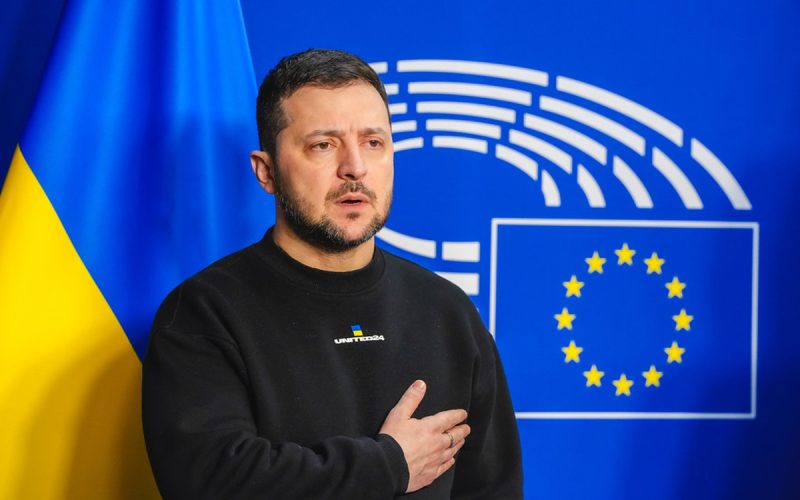Ukrainian President Volodymyr Zelensky declared he would step down from his post if it guaranteed Ukraine’s long-sought NATO membership. Speaking at a press conference marking three years since Russia’s invasion, Zelensky said, “If there is peace for Ukraine, if you really need me to leave my post, I am ready… I can exchange it for NATO.”
This extraordinary proposition underscores the urgency of Ukraine’s quest for security guarantees amid an unrelenting war with Russia. For Zelensky, NATO membership represents not just a diplomatic victory but a lifeline for his nation. He described it as “the most cost-effective option for preventing another war,” adding that Ukraine would otherwise need to build a “NATO within Ukraine”—a self-sufficient military capable of deterring future aggression.
The timing of Zelensky’s statement is significant. The war has ravaged Ukraine’s economy and infrastructure, leaving millions displaced. His remarks reflect a calculated gamble: sacrificing personal political ambitions to secure the collective defense promised by NATO’s Article 5.
Trump-Zelensky Feud Escalates
The geopolitical drama took another turn as former U.S. President Donald Trump launched a scathing attack on Zelensky, calling him a “dictator without elections” and alleging he had only a 4% approval rating—a claim widely disputed by Ukrainian polling data. Trump’s remarks have fueled tension between the two leaders, who were once allies during earlier phases of the war.
Zelensky’s actual approval rating stands at 57%, according to the Kyiv International Institute of Sociology. In fact, Trump’s criticisms appear to have bolstered Zelensky domestically. Petro Poroshenko, Zelensky’s predecessor and frequent critic, even tempered his stance, stating, “There will be no criticism of Zelensky as that is not what the nation requires at this moment.”
Elon Musk Joins the Fray
Adding fuel to the fire is Elon Musk, owner of X.com (formerly Twitter), who accused Zelensky and his supporters of manipulating the platform’s “community notes” feature to counter Trump’s claims. Musk tweeted, “Unfortunately, @CommunityNotes is increasingly being gamed by governments & legacy media. Working to fix this.” He went further, alleging that Zelensky is “running a massive graft machine feeding off the dead bodies of Ukrainian soldiers.”
The Constitutional Dilemma of Wartime Elections
Trump has also called for new presidential elections in Ukraine—a demand complicated by wartime realities. Ukraine’s constitution prohibits elections during martial law, which has been in effect since February 2022. Millions of Ukrainians remain displaced abroad or stationed on the frontlines, making voting logistically impossible.
Zelensky’s presidential term technically expired in May 2024, but elections have been postponed due to the ongoing conflict. Critics argue that this delay undermines democratic norms; however, even opposition figures like Poroshenko acknowledge the impracticality of elections under current conditions.
NATO Membership: A Strategic Gamble
For Ukraine, NATO membership represents more than symbolic alignment with Western powers—it offers tangible security guarantees against Russian aggression. Yet the path to membership remains fraught with obstacles. While NATO leaders have expressed support for Ukraine’s sovereignty, formal membership requires unanimous approval from all member states—a hurdle complicated by geopolitical considerations.
Admiral Pierre Vandier, NATO Supreme Allied Commander Transformation, sought to reassure allies about U.S. commitment to the alliance amid Trump-era skepticism. Vandier stated that U.S. Secretary of Defense Pete Hegseth had pledged unwavering support for NATO during recent meetings with the North Atlantic Council.
“The U.S. is just arguing about a better NATO—a more efficient and lethal NATO—which I think everybody concurs with,” Vandier said.
Global Implications
As world leaders prepare to gather in Kyiv on Monday to discuss security guarantees for Ukraine, Zelensky hopes his gamble will shift the narrative in favor of NATO membership. Whether his dramatic offer will succeed remains uncertain—but it has undeniably reshaped global conversations about alliance politics and transatlantic security.
Ukraine’s plight serves as a stark reminder of the fragile balance between national sovereignty and international solidarity in an era defined by shifting alliances and escalating conflicts.
For now, Zelensky remains at the center of this geopolitical storm—a leader willing to risk everything for his country’s future on the global stage.
This unfolding drama encapsulates not just Ukraine’s struggle but broader questions about democracy, leadership, and global security in an increasingly polarized world.





